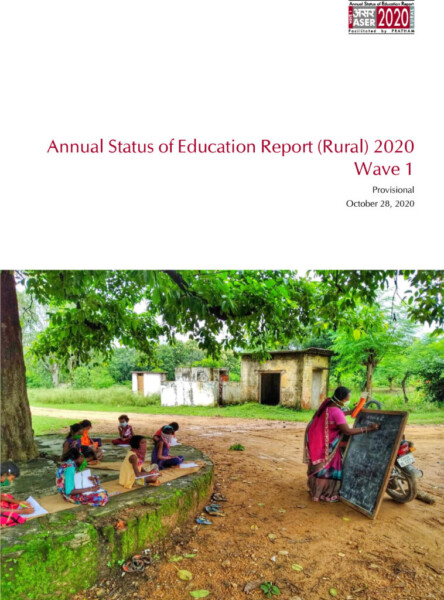ASER 2020 Wave 1 Report Released

On Wednesday, October 28, Pratham’s ASER Centre released the 2020 Wave 1 report, the latest iteration of the influential Annual Status of Education Report that provides estimates of children’s schooling status and basic learning levels. Since 2005, ASER has provided invaluable data about school enrolment and children’s learning in rural areas of India. It has also sparked a movement of citizen-led assessment on three continents.
In light of the pandemic, ASER Wave 1 was carried out entirely by phone with the aim of understanding the provision of and access to distance education mechanisms, materials and activities rather than assessing fundamental math and reading skills. In addition, the survey explored the ways in which children and families are engaging with these remote learning alternatives. The volunteer-driven survey, conducted in September of 2020, reached 120,000 households in 17,000 villages across 30 states and union territories. Caregivers of five- to 16-year-olds were asked the following questions:
- What resources do families have to support children’s learning at home?
- How are families and other community members helping children with learning activities?
- What learning materials and activities are children and families receiving from schools?
- How are families and children accessing learning materials or activities?
- Are children engaging with these learning materials and activities?
- What kind of contact do teachers and children/parents have with each other?
- What kinds of challenges are families and teachers facing with regard to remote learning?
The survey produced extensive data from which clear patterns have emerged.
Enrolment is steady: Although the number of children not currently enrolled in school is higher than in 2018, for most age groups these differences are insignificant. However, there was a slight shifted from private to government schools regardless of grade or gender (66.4% of boys compared to 62.8% in 2018).
Parental education is critical: 54.8% of children whose parents had completed grade 5 or lower received family support compared to 89.4% of children whose parents had studied beyond grade 5. In higher grades, the assistance of older siblings becomes more important.
Resources are more accessible: Among enrolled children, more than 61.8% live in households with at least one smartphone, an enormous increase from 36.5% in 2018. More than 80% of children have textbooks for their current grade.
ASER 2020 Wave 1 was released virtually and accompanied by two panel discussions. “Digital Future,” moderated by Pratham Co-Founder and President Dr. Madhav Chavan, featured Ashish Dhawan from the Central Square Foundation and Philanthropists Rohini Nilekani and Vineet Nayar. “Learnings from School Closure,” moderated by Pratham CEO Dr. Rukmini Banerji, featured Halsey Rogers from the World Bank Group, Bhaskar Chakravorti from Tufts University, and Rebecca Winthrop from the Brookings Institution.
When schools reopen, it will be important to monitor who returns as well as to understand the degree of learning loss compared to previous years, effective hybrid learning models will need to be developed, and in-depth assessment will be needed to improve digital content and delivery for the future.
Perhaps most importantly, the key to reaching children in under-resourced communities lies closer to home. According to Winthrop, “With the shutting of school doors, education allies outside the four walls of the schools have emerged, and they’ve been enabled by technology. There are many education allies. […] But the one that I think will have the lasting impact—and it is a true silver lining—is engagement with parents and families.”
Learn more about ASER 2020 WAVE 1 at asercentre.org and read about it at the Times of India and Indian Express.
You can access the key documents from the ASER 2020 Wave 1 below:
Press release (English | Hindi)
